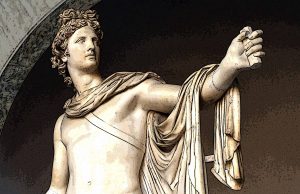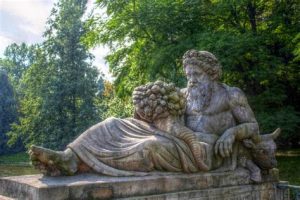Apollo, the god of light, of reason, of proportion, harmony, number – Apollo blinds those who press too close in worship. Don’t look straight at the sun. Go into a dark bar for a bit and have a beer with Dionysis, every now and then.
– Author: Ursula K. Le Guin
I’ve been doing a lot of thinking about what message the universe is sending us with regard to COVID-19. There is, of course, the standard philosophical trope, “life is precious, savor every moment.” True, and even profound, but not exactly insightful if you’re being honest. Rather, there is a darker missive, courtesy of mother nature in its most classic, ancient sense, which is that we are not really in charge of our fates, any more than our paleolithic ancestors.
Sure, we’ve managed to, at least in industrialized countries, create safe cocoons of creature comforts. We go online and shop for a myriad of items that give us pleasure. Vanilla-bourbon scented candles, designer clothing, eco-friendly toys that stimulate the imagination in our children, the latest smartphones and tablets that cost more than many people pay for rent. In fact, worldwide in 2021, consumers are forecast to spend $759.5 billion on fashion-related products alone, according to the website Oberlo.
Yet, there is something at play beyond rampant consumerism, which is merely the symptom. The disease, however, is actually humankind’s ongoing battle to subdue the forces of chaos, disorder, and destruction.
By ensconcing our lives in layers of creature comforts we seek to subdue the daemonic forces of nature.
We wait impatiently for our triple-foam soy whipped vanilla bean lattes; create a myriad of laws, rules, and guidelines to regulate human behavior, including parsing out the very definition of flirtation; adorn our children in safety equipment from head to so they can ride their bikes or skateboards; create “safe spaces” in our schools and universities that naively guarantee a sort of banal emotional blanket of security; take psychiatric medications to allay our fears and subdue our depression; ride like modern sultans in our Bluetooth-equipped cars as we listen to self-improvement seminars and stroke out individualistic natures with personalized playlist; lounge on our leather-clad home-theater seats, equipped with drink holders and compartments for our universal remotes.
With just a click, we can escape the harsh truth: we have never, and will never, call all the shots, and the primitive forces outside our cocoons are bloodthirsty and patient.

Source: astronomy.com
Just when we thought we had the COVID-10 pandemic under control, mother nature twisted the DNA helix and spit out a variety of bastard mutants, once again filling our hospitals with people fighting for their lives, hooked up to ventilators to push the essence of life in and out of our bodies.
As American feminist, academic, and social critic Camille Paglia, puts it, “Nature is always pulling the rug out from under our pompous ideals.” In her sprawling, yet enlightening book, Sexual Personae: Art and Decadence from Nefertiti to Emily Dickinson, Paglia reminds us of the tenuous divide between our hand-created world of order and symmetry, and the bestial, daemonic forces of nature. In reality, this material war has been waged for eons.
The ancient Greek and Roman civilizations capture this dynamic in the ongoing drama of their gods, Apollo and Dionysus. These binary forces have coexisted as diametrically opposed energies that vie for domination. Apollo is the sun god who brings light, warmth, and healing, who protects the young, and nurtures our higher beings with music and the quest for objective truth.
In essence, Apollo was the idealized image of beauty hidden inside our crude, and ultimately decaying exteriors. As the Cuban poet, philosopher, and essayist, José Martí explains, ”Every human being has within him an ideal man, just as every piece of marble contains in a rough state a statue as beautiful as the one that Praxiteles the Greek made of the god Apollo.”
But just as the light cannot exist without darkness and a sea of lies surround islands of truth, Apollo needed a counterpoint to his melody. This was the function of Dionysus, the god of animalistic lust, of disorder and chaos, of a sexual appetite unrestrained by conventions and mores. He is unbridled lust and with an unlimited penchant for carnal pleasures, a bringer of riots and orgiastic pleasures; but at a price.
Dionysus is the guest who shows up uninvited and proceeds to expose the dark secrets and painful truths that pit family members and friends against one another in a debauched, drunken rage, all the while laughing in delight at the chaos he creates. He is the drunk uncle who openly thrives on the destruction he creates, laughing at our foolish sensibilities and pretensions of sophistication.
In the west, in our carefully-crafted webs of comfort, we would like to bask in the sunlight of Apollo, painfully unaware of the darkness all around us, of the dense shadows of Dionysus. But it is a fool’s errand to pretend this can be accomplished.
As the philosopher Nietzsche’s wrote in The Birth of Tragedy, “The two creative tendencies developed alongside one another, usually in fierce opposition, each by its taunts forcing the other to more energetic production, both perpetuating in a discordant concord.” We can no more rid ourselves of Dionysus than we can rid the night sky of the moon, which hangs in the heavens as a constant reminder of our tendency to slip into lunacy. As the modern philosophers Pink Floyd remind us:
And if the dam breaks open many years too soon
And if there is no room upon the hill
And if your head explodes with dark forebodings too
I’ll see you on the dark side of the moon

Source: spiritualray.com
But we struggle against this dynamic, seeking to make sense, to impose order. As Paglia reminds us, “Western science is a product of the Apollonian mind: its hope is that by naming and classification, by the cold light of intellect, archaic night can be pushed back and defeated.”
On some level, however, we can never fully tame the beast that is Dionysus. He is here to stay as earthquakes that bring ruin and destruction in Haiti, as exploding volcanoes in Pompeii that threaten another annihilation, as hurricanes that ravage and submerge New Orleans, as landslides and sinkholes that plunge our car and homes into the abyss, and, though we may deny it, as viruses that plague our global village, bringing us to our collective knees as we ask, “why?” But only Dionysus knows, and he is oddly silent, like an ancient ghost, waiting for his next incursion into our Apollonian world.
At Newsweed.com, we adhere to three simple principles: truth, balance, and relatability. Our articles, podcasts, and videos strive to present content in an accurate, fair, yet compelling and timely manner. We avoid pushing personal or ideological agendas because our only agenda is creating quality content for our audience, whom we are here to serve. That is why our motto is ”Rolling with the times, straining for the truth.”
Your opinion matters. Please share your thoughts in our survey so that Newsweed can better serve you.
Charles Bukowski, the Los Angeles beat poet that captured the depravity of American urban life once said, “There is something about writing poetry that brings a man close to the cliff’s edge.” Newsweed is proud to stand in solidarity and offer you a chance to get close to the cliff’s edge with our first Power of Poetry Contest. Are you a budding bard, a versatile versifier, a rhyming regaler? Do you march to the beat of iambic pentameter, or flow like a river with free verse? If so, here’s your opportunity to put your mad poetic chops to the test. Enter our poetry contest for bragging rights and an opportunity to win some cash!






